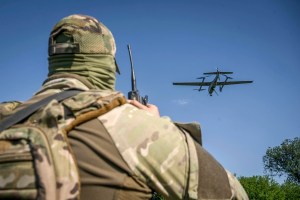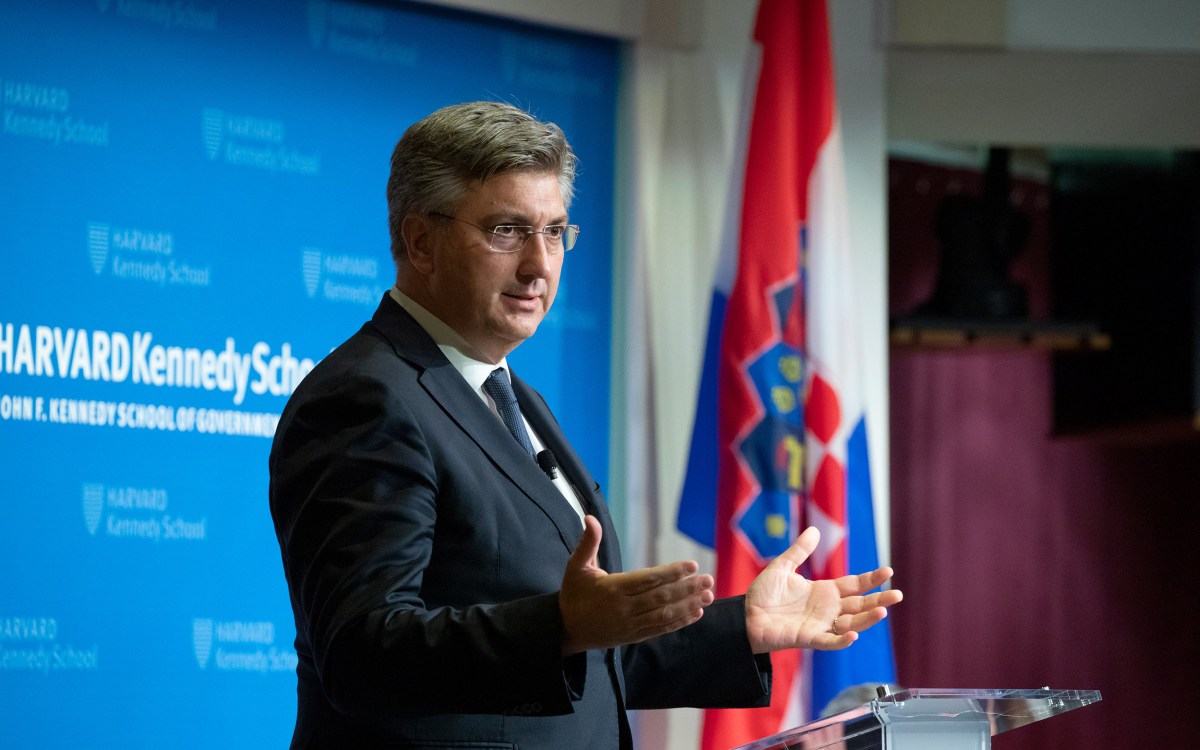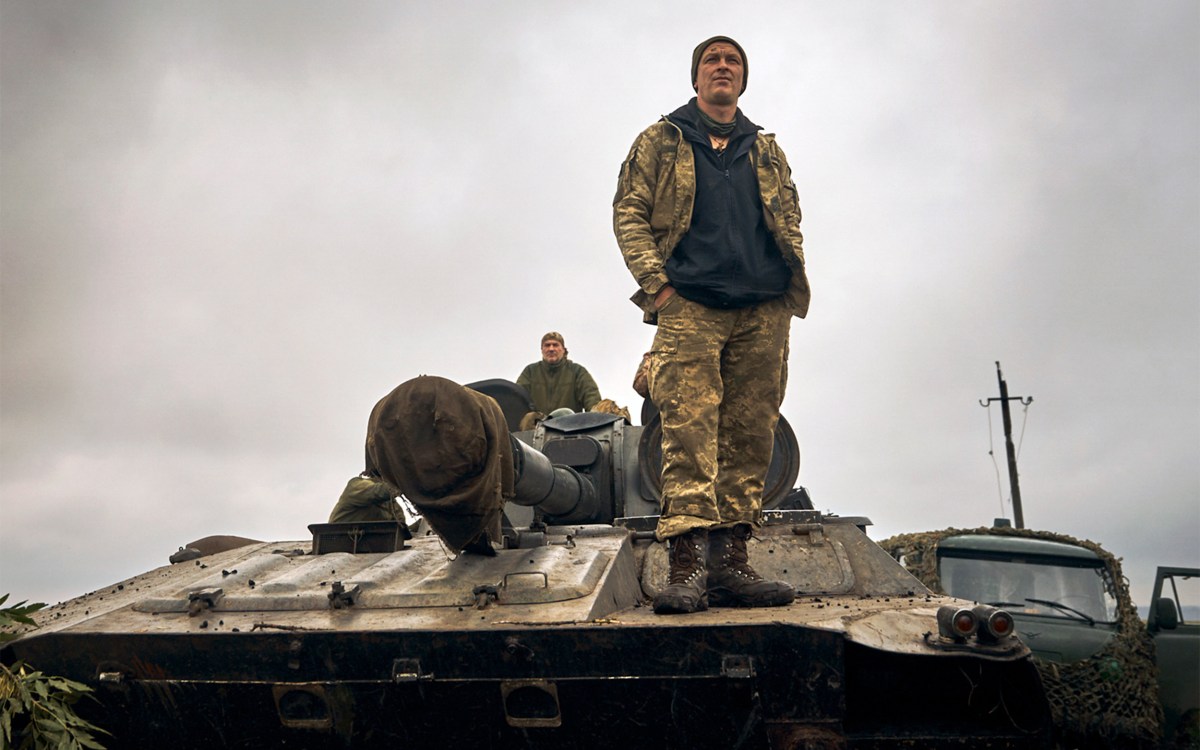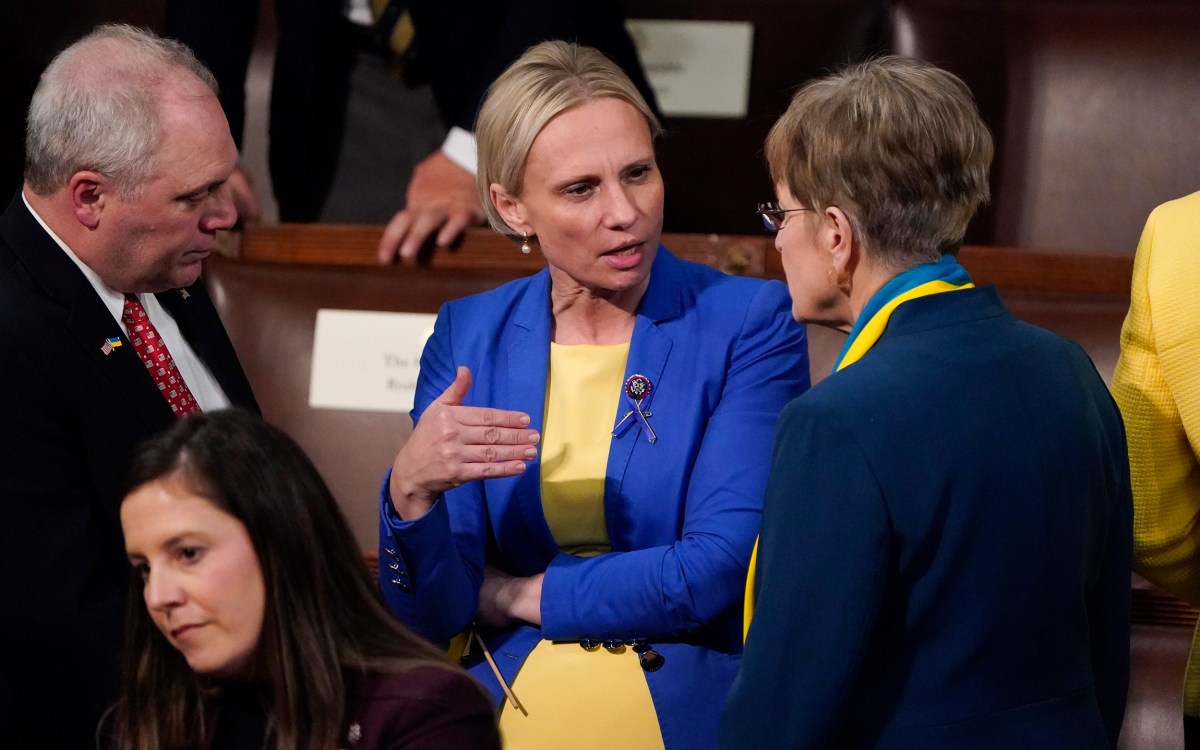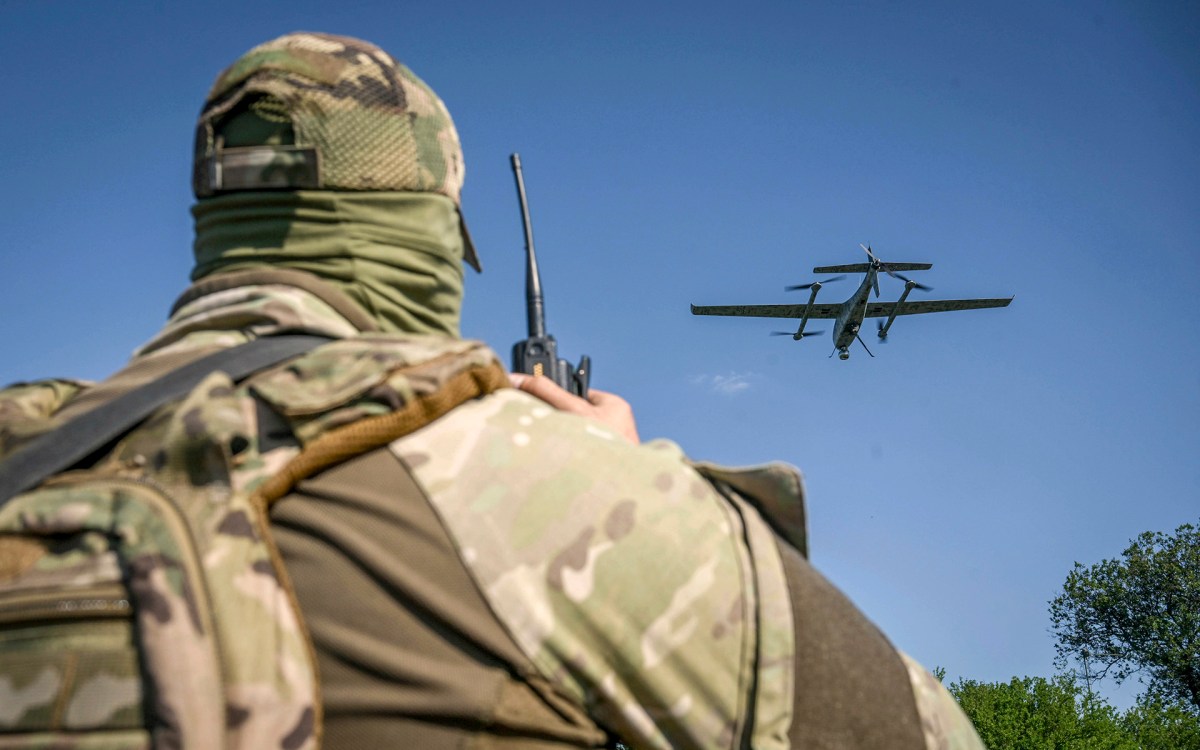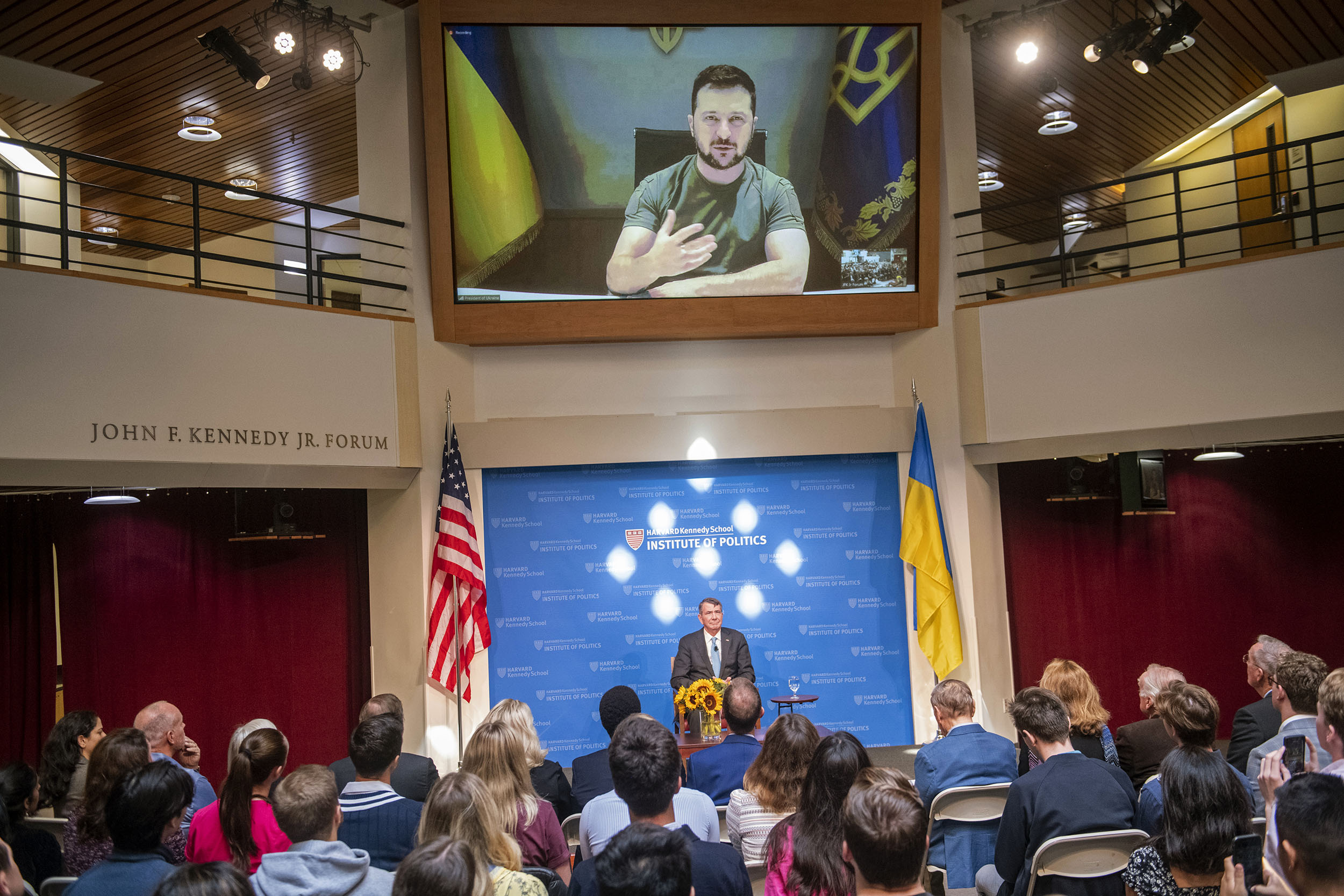
Ukrainian President Volodymyr Zelensky described victory for his country as restoration of “our territorial integrity.” “We want to become whole again,” he told former U.S. Defense Secretary Ashton Carter during a talk at Harvard Kennedy School.
Photos by Jon Chase/Harvard Staff Photographer
‘Be unstoppable, be true to yourself, but be just’
Zelensky talks Russia strategy, nuclear threat, Ukrainian unity, leadership lessons during Kennedy School talk
Ukrainian President Volodymyr Zelensky made the case that playing offense, not defense, is the best strategy in the war with Russia, even as that nation’s leader, Vladimir Putin, has renewed his threat to deploy nuclear weapons after Ukrainian troops scored a series of military victories in recent weeks.
“Prevention is the basis for lasting peace, the measure to cut short any aggression, the measure to save many more lives than you would save by reacting to something that already happened,” he said live from Ukraine during a talk Tuesday afternoon at the John F. Kennedy Jr. Forum at Harvard Kennedy School.
The way to peace is not for Ukraine or its allies to wait to see whether the Kremlin will make good on its “nuclear blackmail” and threats to further annex territory in Ukraine, but to take “preventative” action now to ensure that it does not, he told former U.S. Defense Secretary Ashton Carter, director of the Belfer Center for Science and International Affairs at the Kennedy School, during a discussion about peace and leadership.
Zelensky did not elaborate on what steps he thought would be most effective to achieve that end.
The Ukrainian leader’s stance appears in contrast to the more reactive approach that Biden administration officials signaled this week. Both U.S. national security adviser Jake Sullivan and Secretary of State Antony Blinken said Russia has been warned about its repeated threats to use nuclear weapons in its invasion of Ukraine, and that if it does so, Blinken said, “the consequences would be horrific.”
Zelensky’s comments come amid growing unrest in Russia, where nearly 200,000 have fled to neighboring Kazakhstan, Georgia, and Finland and protests have broken out since Sept. 21, when Putin announced a call-up of 300,000 civilians to replenish the country’s badly depleted armed forces. Since its attack began Feb. 24, the Russian army has suffered at least 60,000 casualties, according to Western estimates. Nearly 3,000 demonstrators have been arrested so far, according to OVD-Info, a human rights organization tracking political activism in Russia.
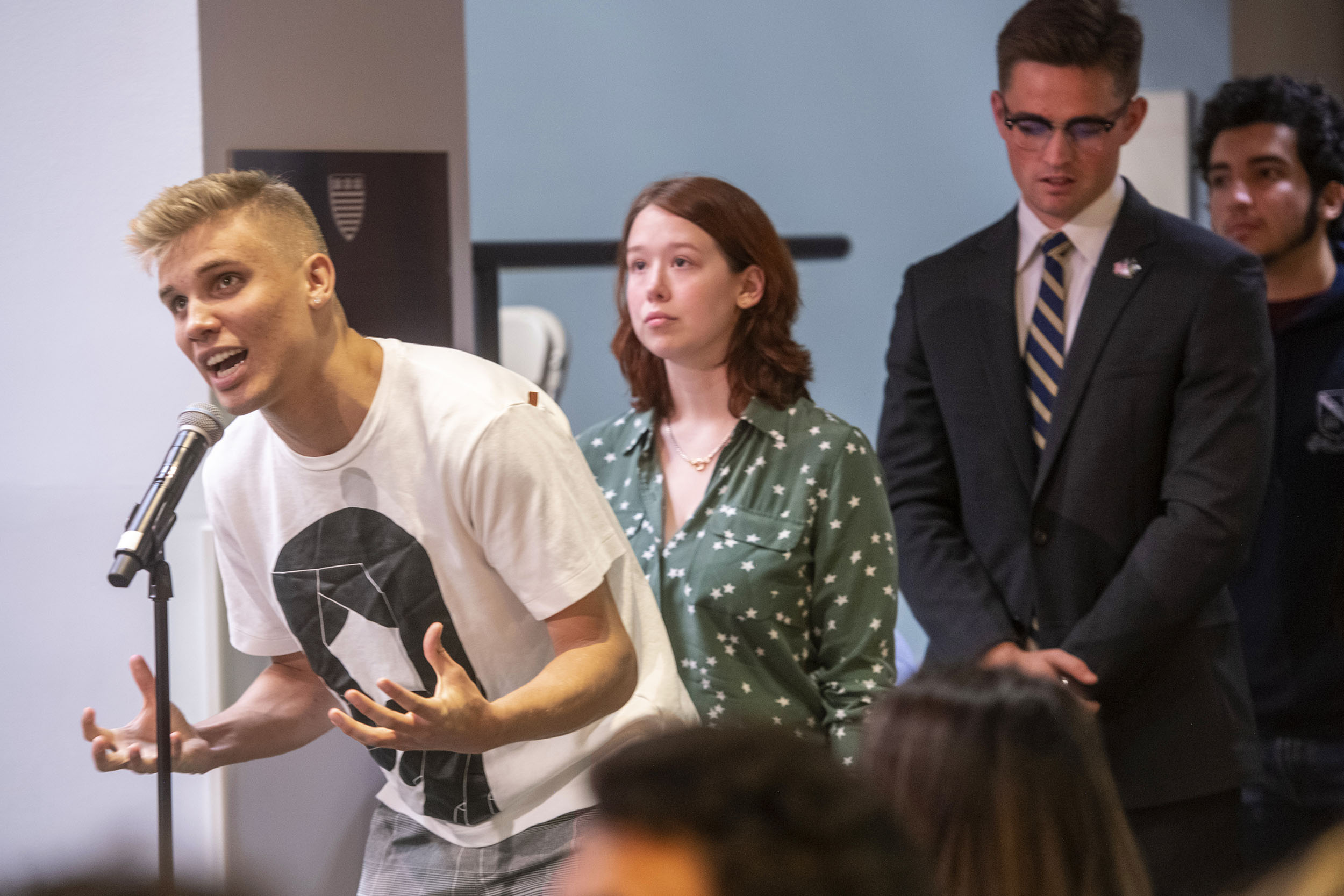
After delivering a short address, Zelensky took questions from the largely student audience. He was asked about his transition to public service after studying law and international trade in college and having a successful career in television. Zelensky said that even though he didn’t pursue a career in either of his fields of study, his background in law became relevant years later when he felt the pull toward politics and realized that he had something to offer Ukraine. “At some point, I felt I can pay back my country with my knowledge, my desires, my strength to help this country move forward,” he said of his decision to run for president.
Carter, who is also Belfer Professor of Technology and Global Affairs, asked Zelensky what victory would look like for Ukraine. Restoration of “our territorial integrity,” he answered, but also for the country “to feel for ourselves that the war is over, that the peace has been regained,” not that some areas have been “de-occupied” while Russia remains in others. “We want to become whole again.”
Yegor Tverdokhlibov, a student from Kharkiv studying at Harvard, asked Zelensky what young people like him should do to help the country once they return.
Because “the key resources of any nation, Ukraine included, is its people,” Zelensky said the best thing would be to spread his knowledge to others back home so Ukraine can rebuild its intellectual, economic, and physical infrastructure.
In the audience was Gen. Joseph F. Dunford Jr., a retired chairman of the joint chiefs of staff who served from Oct. 2015 to Sept. 2019 and is now a Belfer Center senior fellow. Dunford said he was curious about the leadership lessons Zelensky has learned as a wartime ruler.
“Focus on your task and move ahead. Never stop. The moment you stop, your enemies start digging in, which makes everything more complex, more challenging, which will require more resources,” the Ukrainian leader said. “Be unstoppable, be true to yourself, but be just.”
Explaining how he’s been able to lead such a cohesive effort, with an army that’s gone toe-to-toe against the much larger Russian force, Zelensky said it takes highly motivated people willing to follow you and watch your back. “Your key weapon is people.”
At least as important as leadership in their effort so far, he said, is that he and his people share a common set of priorities.
“It is not enough just to live in Ukraine and love Ukraine,” he said. “You have to be ready to give your life for Ukraine.”
The talk was co-sponsored by the Harvard Ukrainian Research Institute, the Harvard Kennedy School’s Institute of Politics, the Belfer Center for Science and International Affairs, and the Ukraine Caucus.


